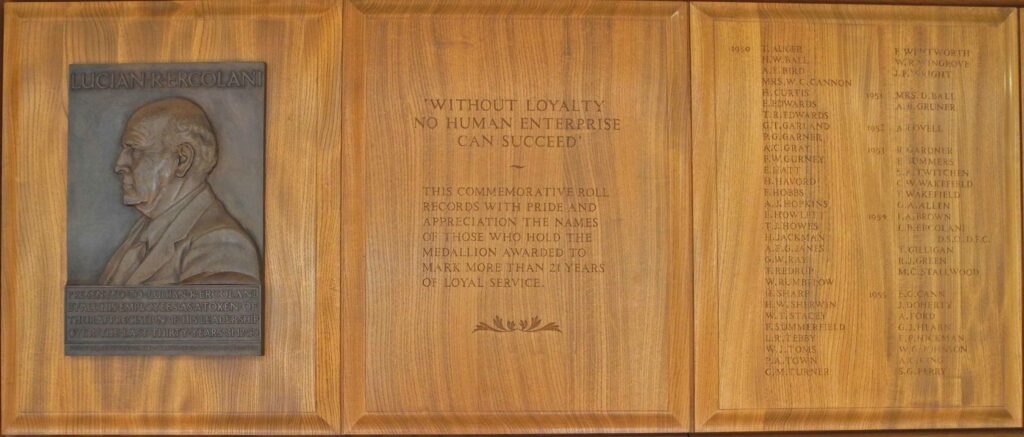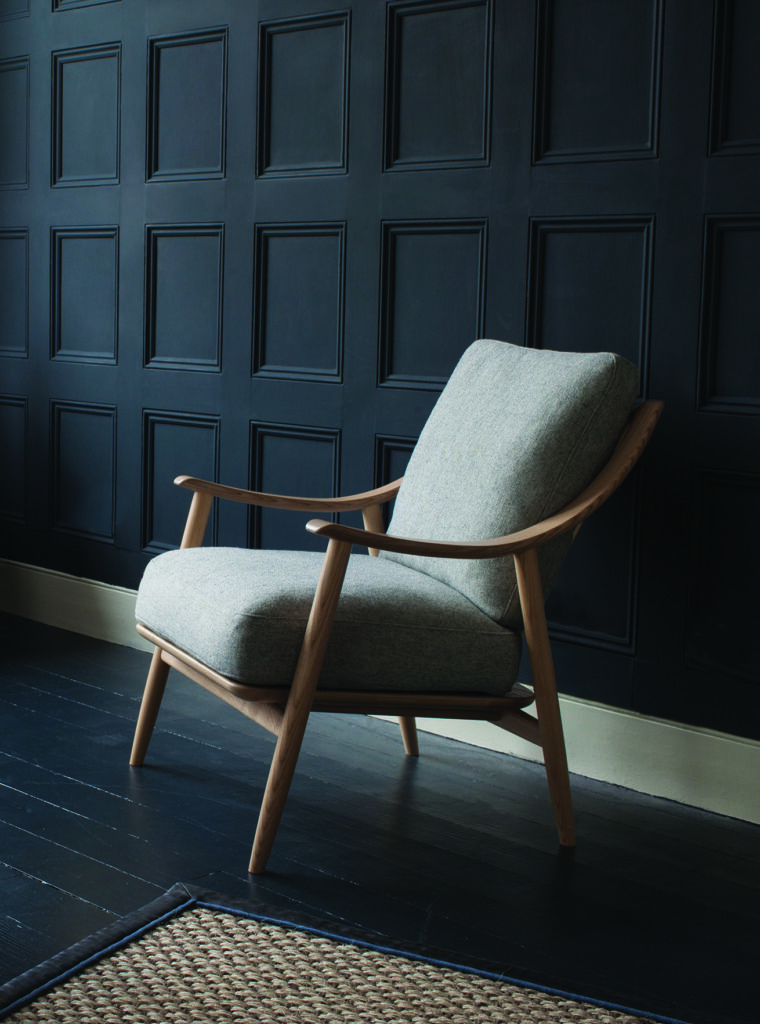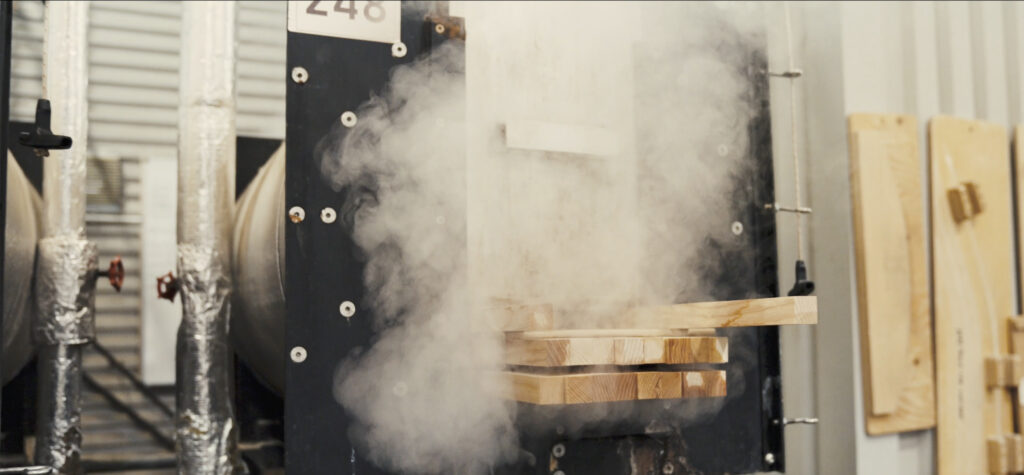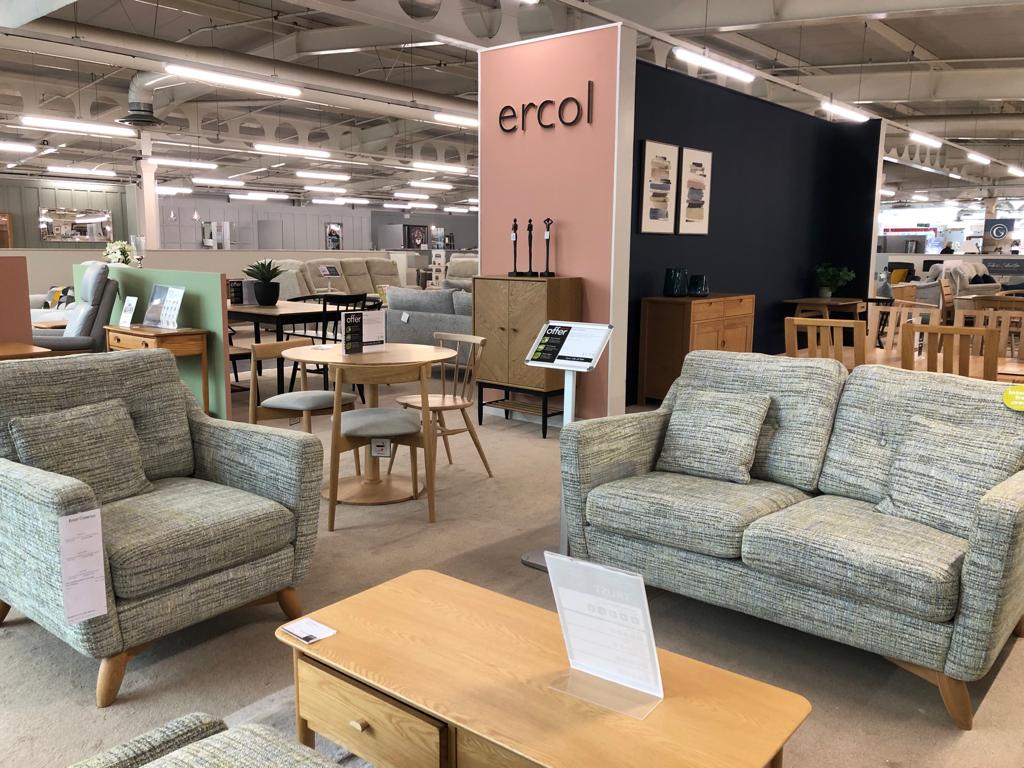Last month, Big Furniture Group unveiled ercol’s new era and partnership with Grown in Britain (GiB), marking the beginning of a long-term vision to re-establish its supply of British grown timber. In this edition, we explore more about the company following our recent visit at the back end of last year.
When reflecting on our visit to ercol’s 160,000sqft factory and showroom in the market town of Princes Risborough, attention to detail is the lasting impression. However, it’s a phrase commonly used in manufacturing, but with ercol it’s a phrase that is warranted. From the initial walkthrough from the showroom, where you get a glimpse of the finished product, to the very start of the manufacturing journey, the experience details every element of craftmanship that goes into an ercol product. The incorporation of newer machinery and processes compliments traditional methods still used in the factory today.
As mentioned previously, hand bending, which is only used on the Evergreen Chair, is skillset that only a few in the business can do, and only a few in the industry can do to perfection. Trying our arm at the skill was a tough task, which reinforces just how skilled the ercol staff are, as well as the attention to detail message. Recapping the process, as it deserves another mention, working in pairs, the wood, after being steamed for precise amount of time, is placed into a steel strap, or restraint, end pressure is applied, and both sides locked in simultaneously – a key part of the process. Then the bending begins, with each side being bent at the same time in a fluent motion. Once in position, more clamps are placed to help protect against grain breakage. When watching this, it looked so effortlessly easy, but in reality, it’s much harder and you learn why it takes a specialist to complete the task.
Did you know that ercol’s steam bending skill is one they have mastered since the 1950s? And that only 21 Evergreen frames can be made per day due to the number of straps. Moving on from one hands-on task to another came a pitstop at the matching area. This, again, echoed the attention to detail ethos at ercol, as the matching station is all about symmetry. Using light, knowledge and sharp eye to see grain variations, wood tops for tables are matched accordingly to make sure the grain and colour blends. Many hours go into this area, which is nicely positioned next to big windows to allow natural light in to match perfectly.

Just a short walk down the line is yet another skill-based zone, and also where sanding really gets started. Fun fact – did you know there are seven key stages of sanding during the manufacturing process? And that’s not including the ongoing manual sanding at each checkpoint. To deal with the amount of sawdust generated, there is a massive maze of extractors overhead, taking the sawdust to the boiler hopper, it’s very impressive. Back to sanding, it was here we met Robert, a very skilled craftsman who has been with ercol for some 44 years. Using the same jig that has been with the company for over 60 years, the process of manual sanding alongside a variety of machines and techniques all goes into making sure product is right. We watched Robert ‘dance’ with the steam bent wood while sanding different parts in one smooth motion, then onto lassoing the frame around his head. It’s actually quite amazing to watch and how effortless it looked.
As the tour continued, we moved across to the assembly shop where we got to see the skill of dovetail joints being slotted together – yet another level of attention to detail. The chair shop was where we met Mario, ercol’s longest serving employee at 59 years. We also met Harry, a third-year apprentice, who showed how the Windsor Chair, ercol’s most traditional product, is made using no screws or metal. It’s a very skilled process, with even more sanding too.
The company works closely with local education partnerships and currently has 14 apprentices. In fact, ercol is known for its long-serving employees and has a plaque at the factory entrance recognising employees with over 21 years of service. There are currently more than 600 names on this list, which has some resemblance to a Wimbledon honours board – if you’re into tennis!
The final point of our tour before a sit down with Henry Tadros, Chairman and 4th Generation of the family business, took us to the finishing department. Yes, you thought right, more sanding is carried out before two final coats of lacquer and heat to seal and dry the finish. We met Simon, who has been with ercol for 39 years, and is only one of four who know how to do this skill. It’s actually one of hardest skills to master in the factory due to getting the right level of coating, which adds that level of protection to finished products.



As the tour wrapped up, Henry shared that business has been positive in the past 12 months and expressed his excitement regarding the sustainable vision the company has through its partnership with Grown in Britain (GiB). Other areas of development at the business are in people and customers, as Henry explained: “The last year or two we have really focused on the people at ercol. We’ve got a great workforce with over 2,000 years of combined experience throughout the business, but we are aware that some will retire in the years ahead and we need to look at bringing in new people.
“Apprenticeships have been growing. We have given a lot of time working with local schools giving tours and holding events to promote the business. I see this growing, when we go out to schools, most 15–16-year-olds haven’t heard of ercol, so what we are doing alongside this, is working with younger age groups 12 to 14 year olds offering schools factory tours, then a couple of years later, the name will be in their mind. Hopefully this helps encourage more young people to think of entering manufacturing, highlighting that making furniture is interesting and satisfying work, even if it’s not with ercol.
“On the sales side, we’ve been working with our retail customers to help invest in their store displays and encouraging the best way to display and sell our brand in store. This transformation has been doing really well. Our showroom which was recently refurbished to a plan created by our Design team shows the way to display our furniture and we’re helping our retailers to replicate this. It’s an all-encompassing look, that goes from website through to display.
“The company is always evolving, we have huge heritage and knowledge, as shown in the factory, gained over the last 100 years, so the future is now about making sure that we stay relevant and are reaching new customers. We’re always looking forward, and as well as having chairs designed by my great grandfather, we are constantly designing new pieces such as the Ibstone Cabinet or the Heritage chair collection, that fit with the way we live today.”















